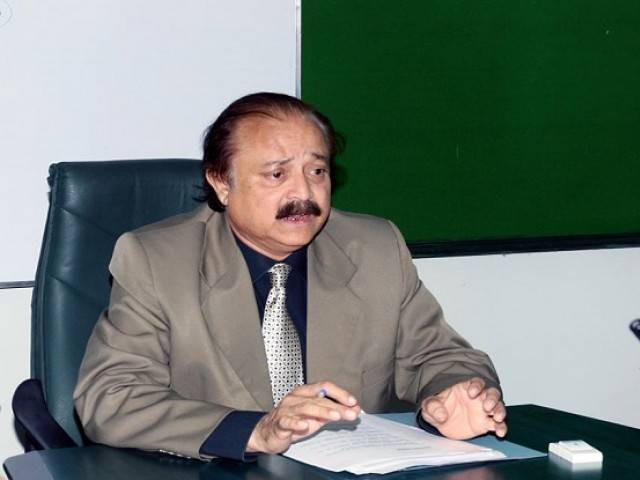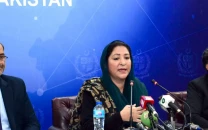SC orders removal of KWSB managing director, secretaries
Order says the officer was serving a cadre position while being a non-technical cadre officer

Misbahuddin Farid. PHOTO: KWSB
Apart from the Karachi Water and Sewerage Board (KWSB) managing director Misbahuddin Farid, the apex court ordered removal of the non-cadre officers: Parkash Lal, who was holding the acting charge of law secretary, and Ahmed Junaid Memon, who was working as irrigation secretary.
A three-judge bench, headed by Justice Amir Hani Muslim, directed the provincial chief secretary to appoint ‘eligible’ officers as KWSB chief, and secretary for the law and irrigation department by Tuesday (today).
Change of guard: Sheikh given charge of KWSB after Farid’s ouster
The apex court’s bench, which also comprised justices Qazi Faiz Isa and Faisal Arab, was hearing a case on poor supply of potable water and deteriorating sanitation conditions in Sindh at SC’s Karachi Registry.
The judges had resumed the hearing to see the report submitted by a SC-appointed judicial commission to inquire into the causes and reasons of water scarcity, sanitation deterioration and its impact on the environment.
During the proceedings, the additional secretary of the provincial services department, Sohail Qureshi, pointed out that Farid was illegally holding a technical post despite being a non-technical person. Farid fairly conceded he was not a cadre officer but was posted under the SC order on grounds that it was a technical post.
KWSB to set up own power plant
Justice Hani observed perhaps, at the relevant time, it was not brought to the court’s notice that the MD was not a technical post but was an administrative office notified as cadre post by the Sindh government. The bench directed the provincial chief secretary to appoint an eligible cadre officer as the chief of KWSB immediately.
The judges confronted advocate-general Barrister Zamir Ghumro about non-performance of the law department, which was being run on the acting charge basis by an officer, who was not qualified to hold the post of law secretary.
Justice Hani observed that all the provincial secretaries were notified as cadre officers and the Sindh government cannot post a non-cadre officer as secretary. Nothing that the law secretary’s office was vacant for several years, the bench also ordered the chief secretary to immediately appoint any cadre officer to the post by Tuesday (today).
“Likewise, the office of the secretary irrigation is also an administrative post, but is held by a non-cadre officer,” Justice noted, directing the CS to appoint any cadre officer to the post of irrigation secretary by Tuesday.
Improving water supply, sanitation
In December last year, the court formed the commission, headed by a sitting judge of the Sindh High Court, to conduct the inquiry on a day-to-day basis and submit a report within six weeks.
At the outset, a comprehensive report, containing 130 pages, supported by documents was submitted by SHC’s Justice Muhammad Iqbal Kalhoro, which was taken on record.
The judges directed the office to display the report on its website since this was a public interest matter. With the court’s permission, a video prepared by petitioner Shahab Osto was also shown in the courtroom showing the state of water, disposal of sewage and waste in different cities was shown to the officers concerned.
The judges noted that no one disputed that the video did not accurately depict the dismal prevailing state of affairs.
Farid informed the bench that there were three sewerage treatment plants installed at Mehmoodabad, Shershah and Mauripur in Karachi. To this, petitioner Usto pointed out that all three plants have not been working for the last 23 years. A sewerage treatment plant’s functioning life is 80 to 100 years, he added. Farid replied that the sewerage treatment plant at Shershah was not working due to lack of repairs.
Water hydrant case: Sindh High Court summons KWSB managing director
“Do you know where a sewerage system was introduced in the world,” Justice Qazi Faiz Isa asked the provincial officers, who were unable to answer. “It was in Sindh, at Moen Jo Daro,” he told them.
Meanwhile, the local government secretary said the land of Mehmoodabad sewerage treatment plant had illegally been leased to individuals by the former city nazim, Syed Mustafa Kamal.
The bench directed AG Ghumro to file a reply on behalf of the provincial government on the inquiry commission’s report. Ghumro sought time to go through the report and submit a reply.
It also directed AG Ghumro to visit all the water filtration and sewerage treatment plants in Karachi along with the KWSB chief and the petitioner and submit details about the current status of the plants along with photographs by Wednesday.
Poor performance
The judges confronted AG Ghumro on the poor performance of departments being run by officers on acting charge.
The bench remarked that all the secretaries are cadre officers so the government cannot post any non-cadre officer on such posts. They observed that the present law secretary was holding the acting charge of the department for a long time.
“We, therefore, direct that the chief secretary shall immediately appoint any cadre officer to the post of the law secretary by tomorrow,” ordered Justice Hani, who was heading the bench. “Likewise, the secretary irrigation’s post is also administrative post. The chief secretary shall appoint any cadre officer on the post by tomorrow,” he added.
Sukkur’s urban services shock judges
The Supreme Court judges were shocked to learn that the North Sindh Urban Services Corporation (NSUSC), which was established by the Sindh government on a loan of $500 million from the Asian Development Bank (ADB) back in 2009 or 2010, had failed to perform its functions.
They were rather surprised to know that the corporation was established by the taluka and district nazims, who had inked the agreement with the foreign lending agency.
Justice Qazi Faiz Isa observed the officers failed to produce a copy of the agreement signed between NSUSC and ADB. AG Ghumro requested for one week to produce a copy of the agreement.
“Time can be given on one condition that you give an assurance that all the provincial secretaries will drink water from taps till then,” remarked Justice Isa, addressing the top provincial law officer, who only smiled in return.
The bench directed the AG to submit details, containing information about the mode and manner in which NSUSC had disbursed and utilised the funds.


















COMMENTS
Comments are moderated and generally will be posted if they are on-topic and not abusive.
For more information, please see our Comments FAQ